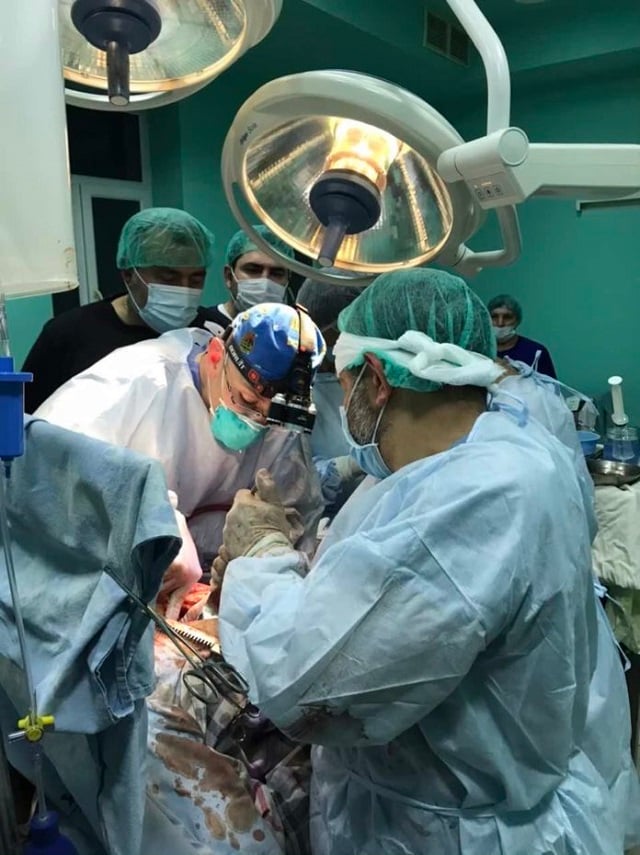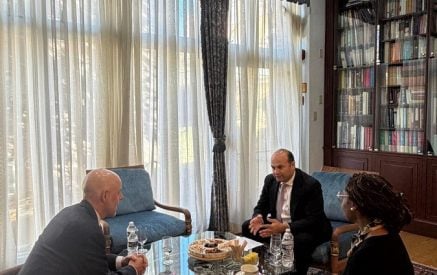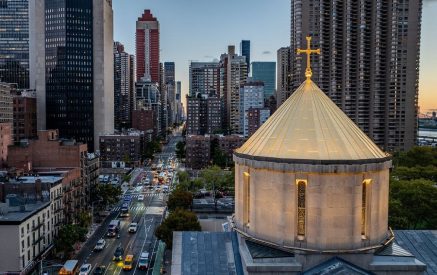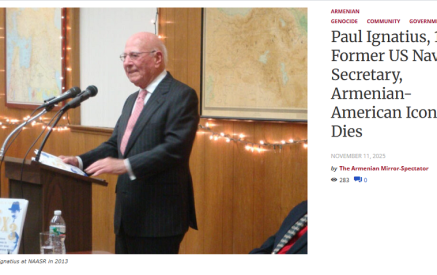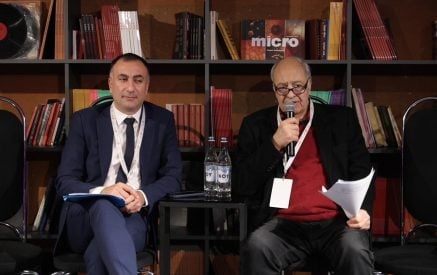The Armenian Mirror-Spectator. LOS ANGELES / YEREVAN – In mid-October, when the war in Artsakh was intensifying, Dr. Armen Aboulian, a general and colorectal surgery specialist in Los Angeles, was one of the doctors who rushed to Armenia to save lives. This wasn’t his first visit to homeland though. For five years in a row, Dr. Aboulian was teaching innovative practices of laparoscopic colon cancer surgery to his colleagues at the Astghik Medical Center in Yerevan.
This time, when he arrived to Yerevan, the Armenian Ministry of Health gave him the option of volunteering in one of two hospitals in the capital city: Erebuni Medical Center or Astghik, where many soldiers from Artsakh were already admitted. Aboulian chose Astghik Medical Center, where he stayed for two and a half days. However, after a few days, he realized that most of the patients who were receiving treatments there had already undergone surgeries in hospitals in Stepanakert or other regions. Dr. Aboulian soon realized that he could contribute more if he was closer to the frontline.
Moving to Goris Medical Center in Goris, Armenia, Aboulian joined a group of doctors and other medical professionals from diaspora and local medical facilities. The days were full of events, sometimes filled with the horrors of war and sometimes with the pure joy of a saved life.
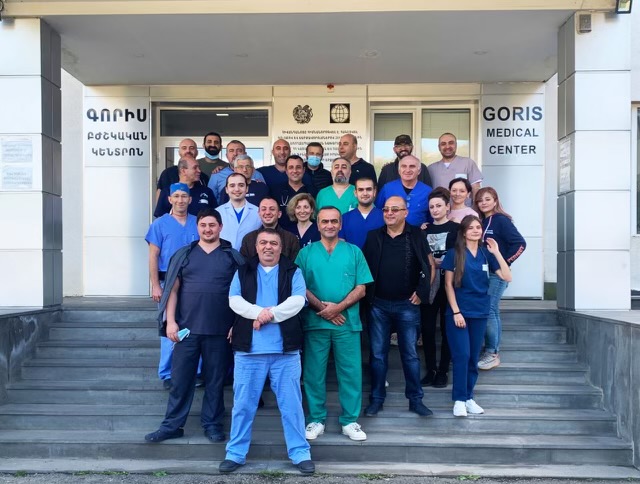
Dr. Armen Aboulian, furthest left in third row from front (with cap), and his colleagues at the Goris Medical Center
“Unfortunately, we would see all types of injuries. The majority of them were from explosions; a lot were penetrated shrapnel injuries. In fact, when we would see a gunshot wound, we would be relieved in a sense in that at least some of the soldiers were in a gunfight. They would have been able to see where the attacks were coming from. Unfortunately, with the explosions, drones and aircraft bombs launched against Artsakh, most soldiers didn’t have a chance to defend themselves,” explains Aboulian.
Read also
“At one point, we even encountered a few soldiers with issues that we had a very hard time to figure out. The soldiers had evidence of a severe lung injury, almost a burn-type injury to the lungs, but there was no sign of a burn on the outside of the body. I’m assuming there was a chemical or barotrarumatic injury that had been caused to the lungs that manifested itself similar to a burn injury. That was the first time that I encountered something like this in my career.” In retrospect, having had a chance to have researched the topic, Dr. Aboulian thinks this was a thermobaric weapon which uses oxygen from surrounding air to generate a high temperature explosion.
Goris Medical Center was admitting patients directly from the frontline and others who were being transferred from the different regional hospitals. They were using Goris Medical Center as a stopping point in order to be transferred again to Yerevan. Doctors in the hospital could check the intensity of military actions with the frequency of arriving ambulance vehicles. “There would be times that three or four hours would go by, and we wouldn’t have a single patient. And there would be times when three ambulances would come with three or four patients in each ambulance,” remembers Aboulian.
Goris Medical Center, like many other hospitals in Armenia, was not prepared to treat soldiers as patients during active war time. They weren’t trauma centers and quite naturally could have been lacking some medical supplies needed in the situations like war. But Dr. Aboulian asserted that he did not experience a major lack of immediate medical supplies. He is certain that they received a lot of medical supplies from the diaspora that was directed to the medical center. However, he is very practical when it comes to the collaboration and support of the diaspora.
“When the diaspora is sending some help to various hospitals in Armenia, it has to make sure to send what is needed and not what is available to send. And if the Ministry of Health [of Armenia] decides that there is a higher need and better utility of the donated material at another hospital, then that item needs to go there,” he said. During his time in Armenia, Dr. Aboulian encountered some serious issues related to the use of donated medical supplies, such as items arriving without the appropriate parts, or without anyone knowing how to safely use a product. “Here, in the United States, we would never expect health care professionals to use a new equipment without proper education and training. We have to use a similar approach when we ship equipment to Armenia,” he observed.
Aboulian finds the solution in systemic changes that can be implemented during the war and peace as well. “For example, when someone has a massive injury on his abdomen and can’t use his intestine, and can’t eat, he can be fed by intravenous nutrition [Total Parenteral Nutrition- TPN]. In Armenia, that is not a well-established option and it’s quite expensive. As a result of the war and possible collaboration with the diaspora, I would love to see a few pharmacies become experts in providing TPN to patients and hospitals. This would be an example of a useful systemic change for Armenia. Sending bandages and gauze pads may look good in pictures for social media, but real change is needed, which comes with systemic improvements to add to the capabilities of the local Armenian people,” he declared.
One thing that the hospital seemed to have was a healthy supply of dedicated manpower. All the volunteers from Armenia and diaspora collaborated at full capacity to help the soldiers. Dr. Aboulian is certain that lives were not lost due to lack of a specific medical supply in the immediate time period after arrival to the medical center. However, the picture was different in the front line, where there were often challenges in transporting the injured from the front lines to safer zones. “The diaspora can continue to be helpful, and this is the time to further increase all efforts. Once such example is in the assistance with wound care, rehabilitation and eventual prosthesis fitting and retraining of the soldiers who suffered limb amputations. This is where the diaspora can come together and help our soldiers to go back to a functional life, get back to work and be a part of a society. Just because the war is over, we can’t let our soldiers feel abandoned,” Aboulian remarked.
During his two weeks in Armenia, he was moved by the maturity of the young soldiers – boys who didn’t break even when severely injured. “Our soldiers, even though they were only 18-years old, were able to appropriately recognize the gravity of the situation and willingly put their lives on the line for their country. This is unique to the Armenian nation. A lot of soldiers that were injured, were saying ‘Doc, when am I going to get better, so I can go back. My friends are over there, the guys are still there. Or my friend passed away next to me, I have to go visit his family and then I can go back to help other ones.. When I think back and compare myself at that age their level of maturity, I see a world of difference. They are impressive,” Aboulian says proudly.
Dr. Aboulian was part of an “international” group of medical professionals, who had arrived to collaborate despite their different backgrounds. Overall, the goal was clear: help the soldiers as fast and effective as possible and send them to Yerevan. “Whatever difficulties we faced, I would expect to face anywhere a war has broken out and a new collaboration is created. In my group, there was a thoracic surgeon from Saratov, Russia, the orthopedic surgeon was from Yerevan, neurosurgeon from Goris, and another general surgeon besides me came from the US. The head of our team was a surgeon with military surgery experience from Russia. Obviously, we had different styles, medication and orders, and the medical language was different, but overall, we had no major issues for collaboration,” he concluded. Aboulian can’t let his colleagues from Armenia stay unrecognized: “I was very impressed by the willingness of the physicians from several Yerevan hospitals that had come to Goris to assist without any reservations, without any effort spared, and often without an end date.”
Dr. Aboulian is planning to return to Armenia to be able to help soldiers in post-war surgeries, where his skills will be needed mostly as a colorectal surgeon. “My efforts, everyone’s efforts in the diaspora need to be doubled down to help Armenia get back where it was before the war and even beyond,” he stressed.
Main caption: Dr. Armen Aboulian performing surgery at the Goris Medical Center




















































